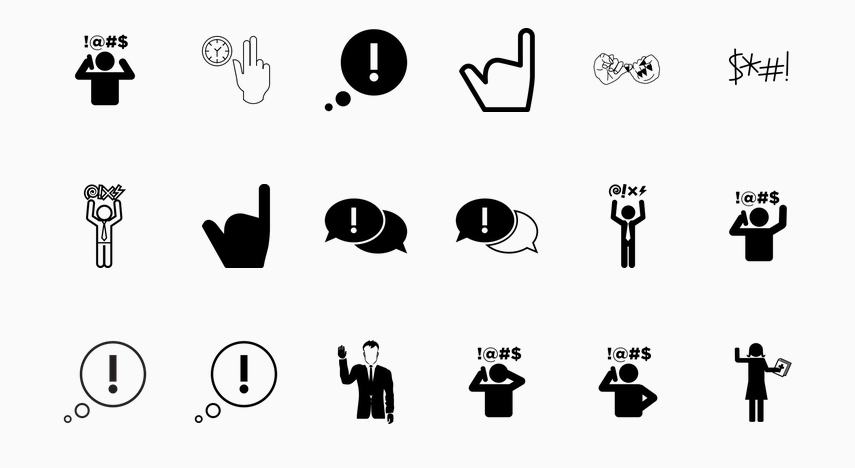
#380
THE PUB THAT BANNED SWEARING
17 Jan 2018 By David Fuhrmann-Lim
Sign in a London Pub: “We wish to inform all of our customers that we have introduced a zero tolerance policy against swearing in all of our pubs. Please kindly respect this policy.” Feck Off, Really?
By Lauren Collins, The New Yorker.
Discussions of public morality often have a teleological bent. People used to behave better, we hear. They never would have got away with this kind of behavior back in the day. But declines, like vasectomies and windbreakers, can occasionally be reversed. Can you put incivility back into the bottle once it’s out? So to the Cock, a London pub that recently banned swearing, to try to answer a question of the moment.
The Cock is part of the Samuel Smith chain of pubs. There are more than two hundred of them, and they are owned by a Yorkshireman named Humphrey Smith, whose old-school tastes manifest themselves in cheap prices, a lack of music or televisions, and “uncompromisingly Victorian” décor. Smith is known to make some sudden moves. He is said to have once closed a pub because he felt that its barmen were filling the pints too high. Apparently, last year the company decided that the language in its establishments was getting out of hand. Signs went up: “We wish to inform all of our customers that we have introduced a zero tolerance policy against swearing in all of our pubs. Please kindly respect this policy.” Last summer, at the Arlington Hotel in Yorkshire, where “please” and “kindly” were not doing the job, a “mystery man” turned up and, according to the Guardian, cleared the bar and kicked everybody out.
Damn. Whether or not that particular word is banned remains unclear (Samuel Smith did not provide a list), but attempting to take the curses out of pubs is a bold maneuver. As a social experiment, it is at once idealistic and authoritarian. The garden can be got back to, it suggests, as long as we all obey the gardener. At the Cock, the ban was already coming up against metropolitan apathy. “You can do whatever you want in the woodwork—it’s more like coming out and being really aggressive,” a barmaid said. “We haven’t had any problem.”
From a table near the door, bits of inoffensive chatter could be heard. “It was basically just biscuits and heavy cream,” someone was saying. Had the campaign successfully rendered the public discourse more polite, or just driven the dirty words out of earshot?
A youngish man wearing a cardigan and tie was asked how many times he and his party had cursed since entering the pub: “Zero, because we’re in a business meeting.”
Nearby, two colleagues in sweatshirts were sitting at a table. They set up conference rooms for a living. “Probably, like, ‘fuck,’ ‘shit,’ and ‘plonkers,’ but that ain’t really a swear word,” one of them said, making an inventory of profanities.
“Swearing is just bad grammar,” another customer suggested. “I use it when I can’t find another word.”

All illustrations/icons from Noun Project
He was with a friend who claimed that the Irish were the most prolific swearers on earth. “When they pronounce the c-word, it sounds like they spell it with a ‘k,’ ” the friend said.
A pair of women drinking rosé were flouting the prohibition with abandon. “Can you bar it from a pub?” one of them said, letting the four-letter words fly. “Can you bar it from the street?” They were the libertarian flank of pub society.
According to Emma Byrne, the author of “Swearing Is Good for You: The Amazing Science of Bad Language,” profanity can ease pain, increase productivity, and help foster social cohesion. “It’s an intense emotional signal,” she said, citing the fusillade of curse words that Rose McGowan has recently aimed at sexual predators and their enablers.
Byrne explained that even chimpanzees can curse. The idea that we were once more courteous and less obscene is a fiction. “That attitude has to come from a place of privilege,” she said. “If you can be in this world, and not feel a level of intense frustration, upset, or even desperation such that you do not feel the need to swear, then you are in a very lucky position indeed.” She continued, “I think the thing that changes is what we consider taboo. It used to be uncivil to talk about bodily functions; now it’s uncivil to be outright fucking racist.” When Donald Trump called Hillary Clinton a “nasty woman,” Byrne said, “he couldn’t use the c-word, because he was on TV, but it was obvious what he meant.” And, if it wasn’t, then came “shithole.”
At the pub, the women had almost finished their bottle of rosé. They were checking their phones for messages. One of them looked up from her screen and said to the other, “I feel fragile tonight for the first time in a while.”
Read it at The New Yorker
Like this? From A to Z, 26 Useful Words in the Booze Business
Like this? Decoded: The Secret Lingo of Bartenders

You might be interested in...
ALTERED CARBON
Why Hangover-Free Alcohol Is The Way To Go, And Other Trends Shaping The Future of Drinking.
LEO'S CLUB
We Dig This Sophisticated Retro Vibe For Leo's Club in London.
DAILY BREAD
This Beer is Made With Leftover Bread Because Drinking is Way Better Than Wasting Food.
ALTERED CARBON
LEO'S CLUB
DAILY BREAD